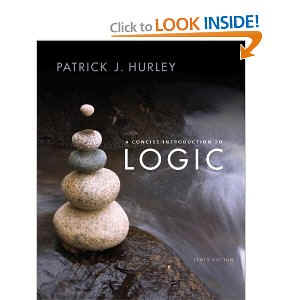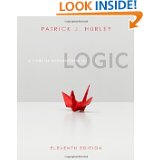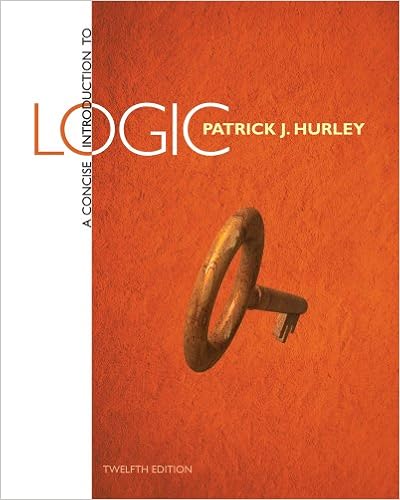|
Philosophy 170 Critical Thinking
|
|
|
|
|
|
|
| Professor: Dr. Charles Wallis |
Phone: |
| Wallis Office: 908 MHB |
Wallis Office hours: M,W 12:45-1:45pm
and by appointment |
| Wallis e-mail:
charles.wallis@csulb.edu |
Web Site: http://www.csulb.edu/~cwallis/170/170f.html
|
*Note: the Hurley book is expensive. For this reason (and because it doesn't cover many important skills and topics) I am working to eliminate the text. However, you will still need the Hurley text for several chapters this term. I request used copies in my book orders and allow students to use the 9th through 12th editions. Note: Many of topics in the course do not have corresponding sections in Hurley. However, Hurley's text is the only text for many sections of the course. The syllabus contains links to the readings for topics not covered by Hurley. Below are links to places to buy the book on-line.
|
|
|
|
|
| 10th
Edition 2008 |
11th
Edition 2011 |
12th
Edition 2014 |
13th
Edition 2017 |
Understanding Critical Thinking, Inferences, & Arguments
| WK 1 | Motivation for Course/Elements of Critical Thinking/Information Ecosystems |
|
Readings: Wallis Notes Chapter 1: What is Critical Thinking?; Chapter 2: Information Ecosystems: Definition, Functions, and Historical Development |
|
|
Doings: Homework Due: Complete Study Habits Inventory |
|
WK 3 |
Innate Reasoning Abilities |
| Readings: Wallis Notes Chapter 4: Information Ecosystems: Crafting and Curating Comprehensive Systems for Fact-finding and Fact-checking; Chapter 5: Inferences and Human Inference Abilities | |
|
Doings:
Online Test Covering Chapter 1: What is Critical Thinking?
and Chapter 2: Information Ecosystems: Definition,
Functions, and Historical Development Homework Due: |
| WK 4 | Innate Reasoning Abilities/Arguments |
|
Readings: Chapter 5: Inferences and Human Inference Abilities |
|
|
Doings: Online Test Covering Chapter 3: Information Ecosystems: Information Superabundance, Architectural Solutions, Confounds, and Conflicts and Chapter 4: Information Ecosystems: Crafting Comprehensive Systems for Fact-finding and Fact-checking Homework Due: |
| WK 5 | Arguments |
|
Readings: Arguments (if complete) or Hurley Chapter 1 *Partial draft of arguments chapter |
|
|
Doings: Homework Due: |
Problems Arising From Content in Reasoning & Argumentation
| WK 6 | Communication, Content, Meaning and Definitions |
|
Readings: Arguments (if complete) or Hurley Chapter 1 *Partial draft of arguments chapter Communication, Concepts, Meaning, and Definitions |
|
|
Doings:
Review for Test #3;
Optional
Extra Credit Exercise;
Video
covering counterexamples Homework Due: |
| WK 7 | Communication, Content, Meaning and Definitions/Framing Problems: Informal Fallacies |
|
Readings: Communication, Concepts, Meaning, and Definitions; Framing, Framing Problems, & Informal Fallacies, Hurley Chapter 3 |
|
|
Doings: Homework Due: |
Formal Deductive Logics: Categorical Logic
| WK 8-10 | Framing Problems: Informal Fallacies/Categorical Propositions: The Formal System |
| Readings: Framing, Framing Problems, & Informal Fallacies, Hurley Chapter 3 | |
| Doings: Informal Fallacies 2nd Lecture Video, Informal Fallacies 3rd Lecture Video Homework Due: |
March
30th-April
5th: Spring Recess (Classes Not In Session)
Formal Deductive Logics: Propositional Logic
| WK 11 | Propositional Logic: The Formal System, Translation |
| Readings: Chapter 6, sections 6.1-6.2 | |
|
Doings:
Propositional Logic Lecture #1 Video; Logical Connectives List Video; Propositional Logic Lecture #2 Video; Link To Truth Table Playlist; Link To Propositional Logic Translation Playlist Homework Due: |
|
| WK 12 | Propositional Logic: The Effective Decision Procedure |
| Readings: Chapter 6, sections 6.3-6.4 | |
|
Doings:
Propositional Logic Lecture #1 Video; Logical Connectives List Video; Propositional Logic Lecture #2 Video; Link To Truth Table Playlist; Link To Propositional Logic Translation Playlist Homework Due: |
Formal Inductive Logics: Probability Theory & Statistics
| WK 13 | Innate Inductive Reasoning Abilities/The Basics of Probability Theory |
| Readings: Chapter 9, section 9.3 | |
|
Doings:
Propositional Logic Lecture #1 Video; Logical Connectives List Video; Propositional Logic Lecture #2 Video; Link To Truth Table Playlist; Link To Propositional Logic Translation Playlist
Test #5 |
| WK 14 | The Basics of Statistics/Innate Judgment Heuristics and Formal Systems |
| Readings: Chapter 9, section 9.4, Innate Judgment Heuristics, Deduction, & Induction | |
|
Doings: Statistics
Lecture #1,
Statistics Lecture #2 Homework Due: |
|
Innate Inductive Judgment Heuristics
| WK 15 | Innate Judgment Heuristics and Formal Systems |
| Readings: Innate Judgment Heuristics, Deduction, & Induction | |
|
Doings:
Inferences Lecture 1,
Inferences Lecture 2 Homework Due: |
Finals Week
Test #6
MW 9:30-10:45am: Friday, May 15th 8:00am-10:00am
MW 11-12:15am: Monday, May 11th 10:15am-12:15pm
MW 2-3:15pm: Monday, May 11th 12:30pm-2:30pm
University
Finals Schedule
Course
Requirements: I will base course
grades exclusively upon (1) six
tests (6 on-line tests) covering the material in the
course readings and lectures 70% of course grade [Two online tests; Test 1
and Test 2 (3.5% each, 7% Total), Test 3 (10.5%) Tests 4,5, & 6 (17.5%) each test], (2) approximately 15
homework assignments (20% total for homework), and (3) class attendance (10% total
for attendance). The 6th test will occur during the finals period of the course
(above). I post homework assignments on the news and announcements page and
collect the assignments on the specified due dates. Grades on individual
homework assignments range from 0 to 3 points. Students will receive 3 points
for complete, largely correct, homework assignments turned in on the due date.
Students will receive 0 points if they fail to turn in an assignment on the due
date. I will take attendance on twelve unannounced days during the term.
Students who attend on an attendance day receive 1 point up to the total of 10
points; absent students
receive a 0. I adhere to the
university policy on
withdrawals.
Make-up exams:
I try to be flexible with regard to deadlines for assignments. For
instance, I generally permit extensions of deadlines, make-up
exams, etc.. for serious illness, personal tragedies, and religious holidays not
recognized in the University calendar. In some cases, I may require a physicians' note
for illness. If you cannot meet a deadline, it is your
responsibility to send me an e-mail
within 4 hours either prior to or after the deadline. Your message must include
contact information, such as a telephone number or e-mail address where I can reach you
to arrange appropriate accommodation.
Cheating and Plagiarism: The
CSULB Policy on Cheating and Plagiarism
will be followed strictly. (See 2005-6 Catalog, pp. 75-6.) Students who have any
questions or uncertainty whatsoever about this policy are responsible for
meeting individually with the instructor to discuss the policy. Students
discovered cheating or plagiarizing on any exam, quiz, or other course element will be FAILED for the COURSE and will be reported to the Office of Judicial Affairs for possible probation, suspension, or expulsion.
Withdrawals: I follow the university policy on withdrawals. I have no disinclination towards signing withdrawal forms up until the last date allowed by the university policy.
Disabilities: I am happy to accommodate any students with disabilities. It is the student's responsibility to inform me of their disability and need for accommodation. The office of Disabled Student Services (5-5061) serves as an information source and evaluates studentsí needs. DSS often proctors tests for students with disabilities.
Goals: The goal of this course is to familiarize students with the inherent strengths and weakness of natural reasoning patterns, the nature, advantages, and goals of good reasoning, as well as formal and informal tools for the construction and evaluation of arguments. In accordance with the standard course outline for critical reasoning "Upon successful completion of the course, the student will be able to: A. analyze, criticize and advocate ideas, based on understanding of fundamental concepts and relationships of logic; B. demonstrate skill in deductive and inductive reasoning and in problem-solving recognizing and using relevant logical principles and some elementary formal techniques; C. criticize constructively his or her own thinking processes, and the reasoning of others, recognizing common fallacies and pitfalls of thought and language; D. show ability to attend to relevant logical, epistemological, and psychological concepts and distinctions informing the relationships of language and thought to the world and to values."
Need some help with your writing? Try the Style and Writing Tips page.
Got Test
Anxiety? Want to work on your learning skills? Check out these pages.
Dr. Tom Stevens Learning Improvement Site
Urbana-Champagne Test Anxiety Page
Western Ontario Test Anxiety Page
|
|



